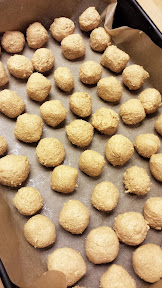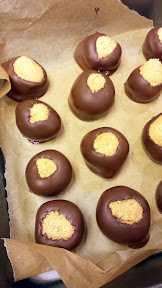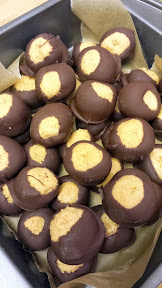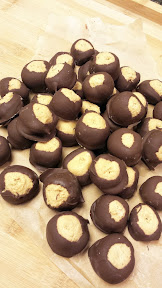Last month, I joined a new online book club, called the Kitchen Reader. There is a new book selected for every month, each book is related to food, and members write a review on their blog during the last week of that month. For October, the book club selected reading was Apron Anxiety by Alyssa Shelasky, based on her life/blog of the same name. So here is my Apron Anxiety Book Review!
My Summary: Apron Anxiety is the memoir of a young, pretty, popular and privileged “it” city girl Alyssa Shelasky and her complicated love affair a celebrity chef that introduces her to the kitchen and food appreciation. Expect the tone to be chick lit, with a wry New York humor to it. Essentially, the book is about her being able to find some center through food that grounds her previously flighty social life and her self-identity as she documents her time back and forth in New York City, Washington DC, and LA. She does “dish” a lot- lots of name dropping in all three cities of celebrities, and although she is vague on who her love, “Chef” is, you can google and find the answer pretty easily though I don’t think knowing his name is essential to the story. But, I know you will totally look it up.
My Humble Opinion: If you are hoping for a lot of stories about how she conquers the kitchen, you won’t see them here- not the way you are told tales by Julie & Julia–My Year of Cooking Dangerously by Julie Powell. Alyssa only shares a few- though the few stories she does share (mac and cheese, banana bread loaves, and cherry pie) are great. I and probably everyone has major oops like that in a dish which still end up being served and eaten hoping no one will notice the screw-ups.
Overall, I thought it was an interesting take on the opposite side of what was Cooking for Mr. Latte by Amanda Hesser where she was the foodie trying to educate her man, but this time Alyssa is the one who knows nothing about food. Both books pair sharing recipes with personal stories of how that recipe fit in with her life.
As you would expect, all three of these books (Julie and Alyssa’s books both come from their blogs, Amanda’s from her column) are self-indulgent, and there were times I had to put each of them down to give myself a break from being irritated. This was particularly the case with Alyssa.
There are a lot more details about to be revealed about what happens through the book below the picture- I think most of the point of the book is not what happens, but the journey so I’m going to go into specifics. But in case you don’t want to know… stop now!

You have to get through the first few chapters, before cooking gets into the tale, to get to the good part of the story. Apron Anxiety first few chapters were especially hard to get through (I did resort to skimming, and maybe put it down a couple times distracted or annoyed). For page and pages, she talks about essentially and incessantly being a popular fun girl in high school and all the partying she does in her 20s as a gossip and celebrity writer, being paid to essentially live it up on the edge of celebrity world and write about it.
That is, until she gets whisked away to Greece after 3 months of dating Chef and drops her life to follow him. Then for the next 9 months makes no friends and doesn’t work. She writes in these chapters essentially of shutting that social life/career down to be celebrity-supported eye candy that waits for him to get home in order to make sandwiches or cereal- she doesn’t even clean because they have a weekly housekeeper.
It’s amazing in that it seems she is able to paid/supported to be living it up not through any moment of hard work (just existing and dealing with the world already seems to be hard work for her), but mostly courtesy seemingly of her looks, the luck of being well-connected with influential people, wit and charm. Fortunately, these latter two characteristics spills over into the voice in her writing. Reading the book’s first few chapters you may want to skip it, but at least skim it – it does help establish a baseline of how crazy she was and how low she goes before food and cooking saves her.
Apron Anxiety at least has the bonus that Alyssa can write well, turning phrases such as “As I cope with the collapse of us, Zagat is my Zoloft” which keeps you reading for how she might describe something dramatically next. She also has a knack for writing honestly and openly like a girl friend in your early-mid 20s talking all night at a sleepover after you’ve opened your third bottle of wine and are getting into the “confessional/emotional truths” part of the late night. Example: her admitting that rather than dining out a lot because she loves exploring, she is using lists of Best Bloody Mary or Favorite Fish Taco “as arrows, as I have no idea what else to do with myself, or where I belong”.
Come on, I know you know what part of the night I am talking about. This whole book is basically Alyssa and you having that part of the night- with only Alyssa doing the talking.

She does a pretty good job of capturing the ups of the relationship with chef (that she dubs “relationchef”) which they just watch reality shows and toasted cheese sandwiches when he is around, and the disappointment and hurt of being second after his push for his career and fame because most of the time, he is not around. I think every woman can relate to at one point, putting herself second to a man, and defining herself by trying to live in his world- it’s an easy mistake of youth that in using society as a mirror, when that first intense love comes along he becomes the entire mirror.
The kitchen and food are what pull Alyssa up finally from her way too dependent life she was existing in for almost a 9 months since moving to DC. Great… but seriously, it took her the amount of time that other women might have a baby to figure out she needed to do something with herself instead of waiting for him to come home from work.
She talks about how she is lonely in DC, but you are told early on about all the people she knows that she leaves behind when she moves, but yet are told not much at the same time. We are mostly told rather than shown friends and family. Their personality is summarized by her in a few sentences, and then it boils down to what they are doing for/to her. I think that is probably understandable in a blog entry, but in a book, her feeling abandoned is an important theme of the story. Yet being told about her amazingly awesome her close friends are for a page or two and then they disappear so long I started forgetting/mixing them up until they appear again to help her out. It is a fracture in the narrative.
At the same time, she is quickly judgmental, dismissing her neighbors when she moves to a new city as too ordinary and all possible friends in DC as profoundly conservative or crazy (she does eventually take back the neighbors judgement, calling it one of the dumbest moves of her life).
For me, that makes it difficult to build a lot of empathy for her as I was reading the book as it presents her as a character who seems so self-centered as she wrings her hands about how she’s frustrated and sad and alone, but then her friends seem to do her giant, selfless favors and provide access to elite connections and opportunities. She even describes herself at one point as “I am the stray who C Street has taken in”, and when hearing a real tragic situation, feels ashamed for “whining about my utterly pathetic bubblegum BS” but then returns to it a few pages later. I kept wondering how long this quarter life crisis was going to go on- and she was having it in her late 20s/early 30s.
It wasn’t until I thought about how I just read Quiet: The Power of Introverts in a World That Can’t Stop Talking that I began thinking of her in another perspective- someone who keeps really going to the extreme ends of the scale of an extrovert needing the energy of others to feed from- which certainly seems to explain why she fades so much in being alone and is not very introspective. Yet, she seems to also have an awkwardness like an introvert where she just wants to stay inside from the world. Making that connection helped me see this book at an interesting level.
The only way she seems to be able to give to others is through food, once she begins- which is already 1/3 of the book in. In Alyssa’s case, you follow along to see how cooking and food becomes an outlet for her to take the edge off, and is way for her to provide for those she cares about. She doesn’t spend much time talking about the flavors of food as much as the process and care of cooking, and the enjoyment she sees when her friends are taken care of by the food. Food tells a story, or evokes emotions for her. Because of this, even when she is alone, she can find energy through food. This seems to be the prime intent of the book, and a fine subject to explore. The way she writes it though, there’s just a lot more of her than writing about food.
She is a maddening mess of totally un-relatable and relatable.
In visiting a lot of dodgy dive-y cheap hole in the walls, she writes “Our bills are always under thirty bucks; I am always too scared to use the bathroom””, but also admits that he opens her eyes to secret gems.
After ducking out of a NY food industry party and changing out of her Louboutins, she walks through the streets of the Village “looking for fresh air and maybe a falafel”.
For the first time she attempts a home-cooked meal, she writes a list in a fuchsia Sharpie, spends $200 and takes multiple selfies to text to Chef, and describes the drive with feeling “pretty cool pretending to be a home cook, with my important grocery list and Made In Brooklyn bag. The car windows are down, the National is playing, and my long, layered hair is pinned up just right. I look good in foodie.”
I can’t help but sometimes roll my eyes as she writes that her wishlist changed from Lanvin flats ($500-$900) to pizza stones and spoontulas or mentions she is walking into an event where her first Herve Leger bandage dress. But then I’m lured back into continuing to read as I laugh at how goofy and self depreciating she can be as she admits into walking into a glass door, undershooting the distance between a car and a wall, or thinking about Madonna as she targets her upper arm muscles while whisking. She also talks about cheese many times.
Basically, how much you will enjoy of this book depends on your ability to enjoy the obnoxious but also fun, emotional somewhat drunk evening with Alyssa.
Food Focus: Very few of the recipes are original- they include a few from her family (a simple “The Pasta”, Banana Bread, 3 ingredient salad dressing, 3 ingredient cocktail among a few) and , and then really common ones like the Neiman and Marcus Chocolate Chip Cookies, and excerpted from others repertoire, like Sarabeth’s tomato soup, a turkey BLT from Gwyneth Paltrow’s My Father’s Daughter cookbook, Nigella’s Fusilli with Toasted Pine Nuts and Feta from Nigella Lawson’s book Nigella Kitchen, etc. I mean one of the recipes is for making cheese toast or making homemade pizza- with pizza dough and tomato sauce from a pizzeria or store-bought. It’s clear her roots as a home cook – and which is refreshing for a book of someone writing about food to not have been culinary trained and schooled in Europe.
One of the recipes is for “Herb-Crusted Chicken for Hungry and Important People”, and she calls it her signature chicken dish. I scaled the recipe down from the original 6 servings to 2, and made this my test of her taste, because who doesn’t love toasted cheese on bread, duh. You can find the recipe here on Elle’s site. I plan to make that sometime in the future.
Along with name dropping of all the amazing restaurant industry people who give her tips (including tweeting with Gael Greene on what to cook!), she also shares a home cook family recipe for Buckeye Balls. I decided to make these as well because they seem to represent her life, a wild juxtaposition of the glamorous with the simple living. And this is probably what you would be doing while draining the bottles of wine and listening to her tell you these tales from her book. I brought these to work for Halloween and they were gone in 10 minutes!
Buckeye Balls
Makes about 60 Buckeye Balls

Ingredients:
- 1 1/2 cups creamy peanut butter (this is the whole 18 ounce jar)
- 8 tablespoons unsalted butter, at room temperature (so yeah, a stick of butter. It gets to room temp faster if you slice it up)
- 1/2 teaspoon vanilla extract
- 3 cups confectioners’ sugar
- 4 cups good quality semisweet chocolate chips (2 12 ounce bags)
- 2 teaspoons vegetable shortening or vegetable oil
Directions:
- In a large bowl (or the bowl of an electric mixer with a paddle attachment), combine the peanut butter, butter, and vanilla extract. Gradually add the powdered sugar until it is well incorporated. It should be a smooth firm dough. If you don’t have an electric mixer you can supposedly mix this with your hand but yeah, I used the electric mixer or who knows how much peanut butter I would have eaten!
- Line a baking sheet with waxed paper. Using your of course clean washed hands, roll the mixture into round balls using 1.5 teaspoons of dough (about the size of strawberries) and place them on the baking sheet. Stick a toothpick to be used as a handle for dipping later in the top of each of the balls, and then place the whole baking sheet in the freezer for about 30 minutes at least.



- When the balls are firm, it is dipping time. First, the dip. She talks about using a double boiler, which I don’t have. She also mentions filling a small saucepan with water and bring to a boil. Reduce it to a simmer and set a heatproof bowl that fits over the pot. Another way is to use a microwave at 50% power at 30 seconds until melty, and then rewarming at 15 seconds or so. I like to use a small ovenware dish at 250 degree F which is deep so I only need to do a cup of chocolate chips at a time with 1/2 teaspoon veg oil for smoothing. Whatever way the point is to melt the chocolate chips and vegetable shortening/oil, stirring frequently until smooth (you might not tell how melty it is unless you stir because the chips keep their shape until stirring).

- Holding each peanut butter mix ball by the toothpick, dip into the melted chocolate, leaving a little bit of peanut butter showing at the top of each ball. Place the finished buckeye back on the baking sheet with the wax paper still underneath to catch dripping chocolate to cool and remove the toothpick and smooth over the holes by using the toothpick to refill/roll it. Refrigerate everything for at least 2 hours to set before serving.



Coming up for my reading for this book club in November: Best Food Writing 2013, edited by Holly Hughes. If you are interested in joining the book club, check out the Kitchen Reader.








